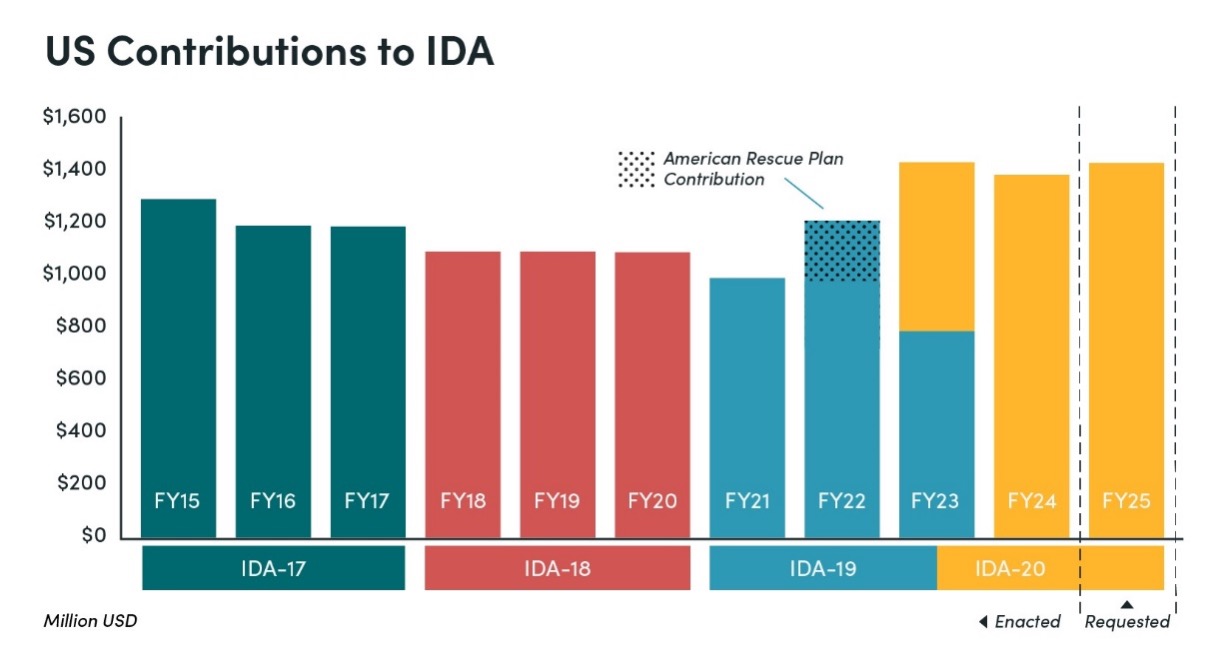This is a joint post with Beth Schwanke.
On Capitol Hill, this time of year is marked by hot, sticky weather and a mad scramble (or is it more of a leisurely stroll this year?) to advance the appropriations process before Members of Congress head back to their districts for the August recess. There’s little doubt that the current political and budget climate, complete with automatic sequestration cuts, is complicating this already herculean task.
At CGD, we’ve been digging into the bills recently released by both chambers’ appropriations committees, which provide funding for the State department and foreign assistance.
- Scott Morris on the MDBs in the House State and Foreign Ops Appropriations Bill
- Jenny Ottenhoff on Global Health
- Senate SFOPs Bill: Full Text, Report, and Summary
- House SFOPS Bill: Full Text, Report, and Summary from the Subcommittee
Last fiscal year, Congress enacted $43 billion in regular discretionary funding (not including the effects of sequestration). For FY14, the House’s version of the State and Foreign Operations Appropriations bill would severely cut spending to $34.1 billion—an $8 billion cut to regular discretionary spending compared to FY13. The Senate bill, on the other hand, would provide nearly $44.1 billion in discretionary spending, creating a gap of $10 billion between the two bills. (Yes, billion). The president’s budget requested $48 billion back in April. Meanwhile, both bills would fund war-related accounts, along with emergency stabilization and humanitarian efforts, at around $6.5 billion, well above the $3.8 billion requested by the president.
What’s Next…and Does it Matter?
Both bills have won approval from their respective committees but neither Majority Leader Reid nor Speaker Boehner has signaled a plan for floor consideration. The dramatic mismatch in top-line and individual account numbers, as well as a number of divisive policy issues, make it more likely that the State and Foreign Ops funding for FY14 will be moved in some sort of continuing resolution vehicle. So, if the House numbers were making you panic, please begin breathing again now.
That said, what’s in the bills speaks volumes about the state of US development policy. You can find summaries of the bills on the House and Senate appropriations committees’ websites. And, as usual, the U.S. Global Leadership Coalition has provided a helpful breakdown. Here’s our run-through of provisions near to the CGD heart:
The Deep Cuts
Multilateral Assistance
Multilateral assistance was one of the most significant casualties among the House bill’s cuts. Check out Scott Morris’s post analyzing the dramatic cuts to the Multilateral Development Bank accounts, but managing to find a glimmer of hope for the future in the flexibility the House would provide by allowing transfers to some of the MDBs from Development Assistance and Economic Support Fund accounts (of course, those would get cut too). The Senate bill, on the other hand, would provide the president’s budget request of full funding for US obligations to the MDBs.
Climate Change Assistance
The House bill would eliminate funding for the Intergovernmental Panel on Climate Change and climate change-related World Bank Investment Funds. While the IPCC cuts are likely to receive more attention, the World Bank’s investment funds represent one of only a few avenues for tackling a grim global public goods problem. The Senate bill includes full funding for the Clean Technology Fund, Strategic Climate Fund, and the Global Environment Facility.
Millennium Challenge Corporation
Given the bipartisan support the Millennium Challenge Corporation (MCC) has traditionally enjoyed in Congress, many were surprised to see that the House bill cut funding for the agency by more than 20 percent to $702 million. However, the report accompanying the House bill includes language affirming the Committee’s continued strong support for the MCC’s mission, noting that the decision to reduce funding was “made without prejudice.” The Senate bill provides $899 million, slightly more than the president requested. We were disappointed to see language from the Senate appropriators directing State, USAID and MCC to "jointly assess and report on the extent to which compacts are aligned with U.S. strategic interests." This strikes us as counter to MCC’s core mission of selecting countries based on good governance—not strategic interests. Both committees urge the MCC to make rooting out corruption a priority in their future work with compact countries. However, this is likely to be quite difficult to accurately evaluate given relatively poor corruption data.
Other Provisions of Note
On-Budget Assistance
The House bill includes language restricting the use of direct government-to-government assistance, reflecting concerns about corruption and opacity in governments that receive US aid. Take a look at Justin Sandefur’s piece dispelling the big myths about on-budget aid, using Afghanistan as an example. Perhaps those Members concerned about corruption in governments receiving US assistance might consider implementing Cash on Delivery Aid, where donors pay only if the contracted-for outcome is achieved.
Power Africa
On his recent trip to Africa, President Obama announced an initiative to double access to power in sub-Saharan Africa. Todd Moss has made no secret of his support for the plan, but he and Beth also expressed some doubt about the impact of Power Africa given its interagency structure. Under the House bill, funding to support the initiative might already be a concern. The president’s budget request included a 30 percent bump in the administrative account for the Overseas Private Investment Corporation (OPIC), an agency central to carrying out the initiative, but the House bill instead would include a slight reduction in funding for the agency. Likewise, zeroing out funding to the African Development Bank could put pressure on the AfDB to decrease its financial and technical assistance support for Power Africa. The Senate bill would deliver the president’s full request of $71.8 million for OPIC’s administrative expenses and a contribution of $32.4 million for the African Development Bank.
Global Health
Despite the challenging fiscal environment, both the House and Senate shielded global health priorities from major cuts. For more detailed analysis, here’s a post from Jenny Ottenhoff. Both bills would continue the United States’ role as the largest funder of global health programs, and global health would remain one of the largest chunks of the 150 account. To put this in context, both the House and Senate would fund global health programs at around $8 billion as opposed to $2.5 billion from the Senate and $2 billion from the House for Development Assistance and $942 million from the House and $1.36 billion from the Senate for IDA.
Country-Specific Provisions
Egypt
The House bill would include $1.3 billion in assistance to Egypt, specifying counterterrorism and border security purposes. The Senate bill would provide $250 million in economic assistance and $1.3 million in military assistance, which would be made available in 25 percent increments based on Egypt’s fulfillment of specified criteria (though we’ll see what happens to Senator Paul’s (R-KY) amendment to the transportation appropriations bill, which would redirect US aid to Egypt to domestic bridges). Both bills refrain from weighing in on the question of whether recent events in Egypt constitute a military coup making the country ineligible for US assistance, though it’s possible the Senate’s increment language was added following these events. For a rundown on US aid to Egypt by the numbers, visit Alexis Sowa’s post.
Pakistan
The House and Senate bills would withhold assistance, including funding via the Economic Support Fund, if the Government of Pakistan fails to cooperate with the United States in efforts to combat terrorism. The United States has clear reason for wanting a strong counterterrorism partner in Pakistan, but it’s hard to believe that a threat to ESF funding will incentivize Pakistan’s military. Nancy Birdsall and Alexis Sowa have suggested that as the Enhanced Partnership for Pakistan Act (more commonly known as Kerry-Lugar-Berman or KLB) nears expiration at the end of 2014 and much of the $7.5 billion authorized over five years has yet to be disbursed, the real need is for a strategic dialogue on development between the US and Pakistan.
Sudan
The House bill restricts aid to Sudan and affirms the US commitment to providing assistance that supports human rights in South Sudan. Kate Almquist Knopf has argued the United States needs a different approach when it comes to relations with the Sudans.
Zimbabwe
Ahead of Zimbabwe’s upcoming national election on July 31, the House bill conveys concern about the Government of Zimbabwe. It would build off of ZDERA, preventing US support of loans or grants at any of the IFIs and would also prevent funding from going directly to the government except for health, education, and macroeconomic assistance until the Secretary of State certifies that rule of law has been restored in Zimbabwe. For other ideas on USG policy towards Zimbabwe, see Todd Moss’s testimony before the Senate Foreign Relations Committee.
Fun Facts:
- The last time Congress passed a stand-alone State and Foreign Operations Appropriations bill: 2005 (FY 2006), although a full bill was included in the Consolidated Appropriations bill for FY 2008 that saw floor time in 2007.
- Number of times the word “climate” appears in the House bill: 0
- Rough (but very conservative) count of the number of reports that would be required by agencies in bill language alone: 60 from the Senate and 65 from the House.
Disclaimer
CGD blog posts reflect the views of the authors, drawing on prior research and experience in their areas of expertise. CGD is a nonpartisan, independent organization and does not take institutional positions.





